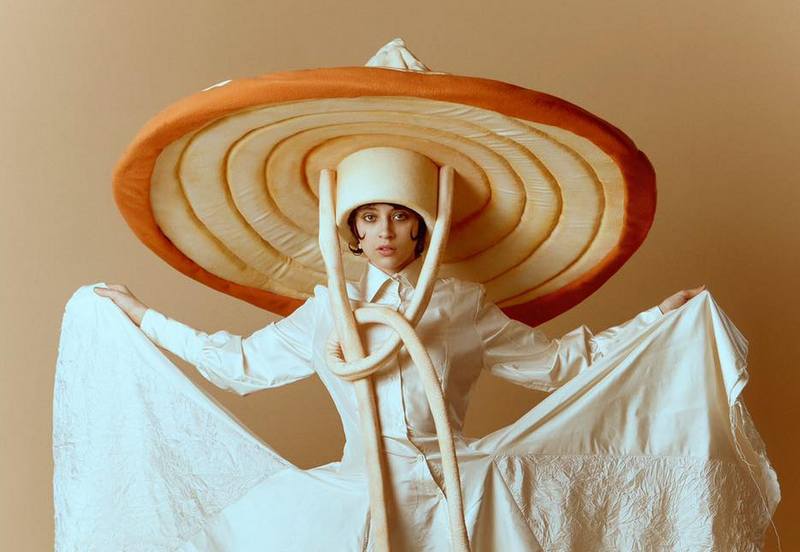Pomme Revisits 'consolation' With Two Stirring Versions of "very bad"

French indie-pop singer-songwriter Claire Pommet—better known as Pomme—has been captivating audiences with celestial vocals and vulnerable lyricism for years, earning her two Victoires de la Musique (the French equivalent to the Grammys), tens of millions of Spotify streams, and an ardent and devoted fan base. For those that aren’t yet familiar with her ethereal and emotive work, the 26-year-old’s latest release provides an ideal introduction to the expansive, acoustic musical world she’s come to be known for.
“very bad (album version)” and “very bad (soft version)” are two sides of the same coin, each warm to the touch and driven by the clear warble of Pomme’s voice and the delicate plucking of an acoustic guitar. In the sparseness of the soundscape, the intimacy of each rendition becomes soft-spoken yet frank, reflective but boldly so, highlighting the candidness of lyrics like “I was never in love with you / I was trying to find myself.” There are, however, subtle differences between the two versions that play out not only in the production choices of each song but also in the acoustic fingerpicking and vocal nuances that Pomme delivers.
The soft version of “very bad” acts like the skeleton of its album version counterpart, using barebones production and barely-there singing to bring a more nostalgic and gentle hue to the song. The album version, by contrast, adopts a slightly springier tempo and more confident and defiant vocals, with an undercurrent of day-to-day background noise layered underneath: clinking glasses and creaking chairs, a barking dog, and blithe laughter all reach a jubilant crescendo in the track’s outro.
Together, these elements lend a sense of joyous release and liberation to the album version that compliments the blistering confrontation of its lyrics, “I recall the last time I saw you, you looked very bad / Don't you find it strange to like girls my age or younger?.” It’s not clear who exactly these scathing lyrics are directed at, but these songs do more than just call out a nameless ex: they effortlessly affirm that person’s now-total irrelevance, proving that an unfazed wave goodbye can be just as effective as a middle finger pointed backward.
We caught up with Pomme over email for more insight into the release.
Ones To Watch: What was the inspiration behind "very bad?"
Pomme: “very bad” is a song that I wrote in May 2021, and I was kind of thinking about a story that I had with an older guy when I was like, 18. And about the fact that other (young) women have had a lot of really weird relationships with older men. However, it’s not a violent and direct song about this, it’s somehow implicit. I’m just referring to this experience of mine and that specific relationship in the song. And also the fact that it’s kind of a systemic problem.
What drew you to produce two versions of it?
The version that I put on my album (the one that I did with my friends) is really raw and rough. It’s like a “kitchen version.” We were having dinner and we recorded this with an iPhone. It’s not produced at all. It’s a “family vibe”. But I just wanted to have something more “clean.” So people can listen to the song, with a studio quality. So, that’s why there is a rough version and a studio version.
This single comes just a couple of months after the release of your third studio album, consolation. Was it a song that didn’t make it onto the album, or did you write it after the album was released?
When I write an album, I write a lot of songs (more than enough). I have spare songs, in case I want to release some stuff (right after the release of the album). “Very Bad” was one of these songs, and I have others in my pocket. It’s usually part of my process to write more songs than I put on the album. It’s not about them being less good, or less powerful than the ones that end up on the album. It’s just that I want to be able to release songs for months after the release of my album. I don’t want to wait too long, that’s why I do it that way.

![Bella Litsa’s “Drasticism” Is Mysterious, Inevitable and Undoubtedly Your Next Obsession [Q&A]](https://s3-us-west-2.amazonaws.com/onestowatch-v2/4_i8_a1538@sandrajamphoto-1771529337.jpg)
![Novulent’s VOL. 3 Is A Feature Film with A Carefully Crafted Script [Q&A]](https://s3-us-west-2.amazonaws.com/onestowatch-v2/unnamed-1771627089.jpg)
![Inside Ally Evenson’s “SPEED KILLS” Short Film Debut at Brain Dead Studios [Q&A]](https://s3-us-west-2.amazonaws.com/onestowatch-v2/save_vid._net_637196595_18565097563019473_4760615889967315430_n-1771618679.jpg)